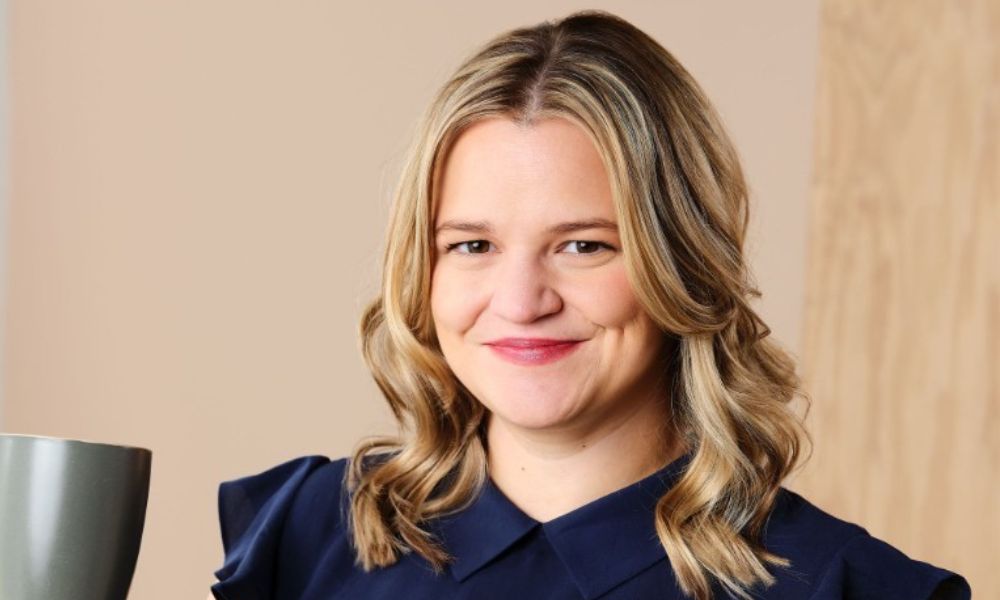CPO at Iversoft talks about getting past education requirements, and the benefits of offering 4-day workweeks

Steph Barlow says she has a “very weird background” considering she’s now an HR executive.
Having achieved a Master’s in Roman history and archaeology from the University of Kent in the U.K., she went on to start a PhD and soon realized academia wasn't for her. That’s when she moved back to Canada.
“I tried to figure out what I was meant to do. And, really, what originally got me into archaeology, into history was my fascination with social history and what people did and why people did things and what created change. And so I started working in HR,” she says.
“Honestly, it was like being able to study modern civilizations, in a way, and I get to experiment with real people and creating change… and try to make my own cultures and see what created cultural change.”
Barlow is now chief people officer at Iversoft in Ottawa, which she joined back in 2016 when it only had nine people, first working as a consultant before slowly moving through the ranks.
“Honestly, it's been quite the adventure. I am definitely very lucky in that I work with a leadership team that always given me a lot of leeway to experiment, to try things… [to] bring in new programs and new technologies and try things out,” she says.
“They allowed me to really stretch and experiment and try things and see what worked.”
Why HR makes sense at smaller organizations
As for the old adage that HR isn’t needed until an organization has an employee count of at least 100, Barlow disagrees.
“I’ve definitely argued with people in the past in that I think that the longer you wait for HR, the more problems you're ultimately going to have down the road. Because you don't have someone owning those systems, creating consistent recruitment and training and retention programs that are actually going to keep people engaged and happy in your organization, and doing work for you,” she says.
“Without someone dedicated to making sure that actually happens, you end up with inconsistency across the organization.”
That’s not to say every employer needs a full-time HR person, says Barlow.
“Even working with an HR consultant or something along those lines can help you find some alignment and create some policies there. But, yeah, I think one of the biggest mistakes that a company can make is waiting too long to bring in someone to help facilitate that growth and that retention.”
Getting past education requirements
As part of that growth, Barlow’s “passion” for DEI has seen success at Iversoft. Having heard about the discrimination that relatives faced as Italian immigrants coming to Canada, along with their difficulty finding jobs, she was motivated to make a difference.
So when Barlow got into recruiting, she thought there should be much less emphasis on education requirements. For example, why did a developer need a computer science degree if they’re completely self-taught?
“It really opened up our applicant pool,” she says, while admitting she understands people’s concerns about taking this approach.
“I talk to different people and they're like, ‘Oh, we could never do that’ and I'm like, ‘Why? Are you hiring doctors?’ I appreciate that there are definitely fields where, yes, I would like my doctor to have a medical degree. But why does your developer need a computer science degree? Why does your marketing person need a business degree?”
War for Canadian talent
Often, employers have talked about the war for talent, but when Barlow started talking to organizations serving immigrants, she realized they were limiting themselves.
“There was this incredible, untapped talent market that people were just ignoring. While going on about ‘the war for talent,’ what they were really going on about was the war for Canadian talent — Canadian-trained, Canadian-educated talent, which was really a shame,” she says.
Since then, Barlow has dedicated a lot of time to coaching and mentoring immigrants, specifically new Canadians, on how they can position themselves in the market, how they can fix up their resumes, to better approach Canadian employers.
“Within my own organization, we do a lot of bias training, with all of our hiring managers, making sure that they're looking at all experience,” she says.
“I always say, ‘I don't care where your experience is from, I want to hear about the quality of that experience.’”
Flexibility helps with retention
Another area that’s important to Barlow is flexibility at work. To that end, Iversoft offers an optional four-day work week. That means core hours of 10 am to 3 pm, Monday through Thursday, and outside of that, employee’s time is their own.
“We've taken out that guilt factor of, ‘Oh, well, I have to be there nine to five’ — that's gone. Now you have this great flexibility with your time. All we ask is, at the end of the day, you do your job.”
And Iversoft has the systems in place to see if work is being completed, just as it would if people were in the office, she says.
“I’ve talked with a lot of leaders and they're like, ‘Well, how would you know that they're working?’ And it's like, ‘How did you know they were working when they were in office? Did you stand over their backs the entire time and watch them do their job?’”
This flexibility has also lead to greater productivity and lower turnover, says Barlow.
“Our retention rate is insane. We've actually had people leave and then come back because they were like ‘No, I missed the flexibility too much.’”
At the end of the day, it’s about creating a culture, an environment where people can participate and feel included across the board, she says.
“It's that feeling, that sense of belonging that you have at work, that really helps our retention.”




